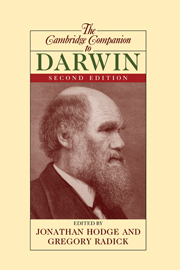Book contents
- Frontmatter
- Introduction
- Part I Darwin’s theorising
- Part II Historical contexts
- Part III Current issues
- Part IV Philosphical prospects
- 16 In Darwin’s wake, where am I?
- 17 Ethical expressions: why moralists scowl, frown and smile
- 18 Is human nature natural?
- 19 Giving Darwin his due
- Guide to further reading
- List of references
- Index
18 - Is human nature natural?
from Part IV - Philosphical prospects
Published online by Cambridge University Press: 28 May 2009
- Frontmatter
- Introduction
- Part I Darwin’s theorising
- Part II Historical contexts
- Part III Current issues
- Part IV Philosphical prospects
- 16 In Darwin’s wake, where am I?
- 17 Ethical expressions: why moralists scowl, frown and smile
- 18 Is human nature natural?
- 19 Giving Darwin his due
- Guide to further reading
- List of references
- Index
Summary
“All the sentiments of the human mind, gratitude, resentment, love, friendship, approbation, blame, pity, emulation, envy, have a plain reference to the state and situation of man, and are calculated for preserving the existence and promoting the activity of such a being in such circumstances.” Hume, Dialogues Concerning Natural Religion (1779), part 3, Section 13 / It is quite common for philosophers, if not biologists, assessing the impact of Darwin on our views about human nature to associate him with Hume. Owen Flanagan even talks of a 'Humean-Darwinian' picture of human nature. In this chapter I want to chart the relation in some detail. The result is not to disrupt the marriage but to suggest, with more precision than usual, how close and how fertile it actually is. / Human Nature / By 'human nature' we generally denote not our bare animal construction - two eyes, four limbs, one head, upright gait and so on - but our rather more exciting psychological traits. Theorists of human nature are particularly concerned with our cognitive and motivational dispositions and capacities, the subjects of Hume's Treatise of Human Nature (1739).
- Type
- Chapter
- Information
- The Cambridge Companion to Darwin , pp. 435 - 454Publisher: Cambridge University PressPrint publication year: 2009



